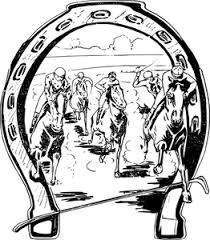Horse racing is an equestrian performance sport involving two or more horses ridden by a jockey over a set distance. Although its origins are somewhat unclear, the sport has been enjoyed by horse lovers and betting enthusiasts alike for centuries. Whether you are already a fan or just looking to find out more, continue reading to familiarize yourself with a brief history of horse racing.
The first recorded horse race
Although it is extraordinarily difficult to pinpoint exactly when and where horse racing was established, some of the earliest recorded accounts can be traced back to the Greek Olympic Games in 700 to 40 B.C. During this time, riders participated in both four-hitched chariots and mounted bareback races. It soon began to spread to neighboring countries such as China, Persia, and Arabia as well as the Middle East and North Africa, where horse racing continued to evolve and develop into the sport we know and love today.
In medieval England, horses were ridden by professional riders in an attempt to demonstrate their top speed to potential buyers. The first recorded racing purse of 40 pounds was also offered during this time for a three-mile race with knights as riders.

Organized horse racing
With horse racing growing in popularity, it wasn’t long before organized horse racing became a popular sport. The King’s Plate races were introduced by Charles II and were one of the first-known horse races in which winners were awarded prizes. They also spawned the first recorded set of horse racing rules, many of which still apply today.
The practice of betting on horse racing can be traced back to this time with the reign of Louis XIV, in particular, a time period during which it was especially prevalent. Organized horse racing in the United States very likely began with the occupation of New York City in the 1600s with a number of race courses cropping up on the plains of Long Island. It is worth noting that, during this time, stamina tended to be the benchmark for equestrian success as opposed to speed.
Modern horse racing
Although there is no universal timeframe, modern horse racing is widely regarded to have begun in the 18th Century. The first modern horse race was introduced in England in 1776 and named the St. Leger. This was then followed by the Oaks in 1779 and the Derby in 1780.
These horse races continue to be some of the most popular among equestrian fans today with horse race wagering now a popular pastime for a growing number of people around the world. OLBG, who provide horse racing tips, are a leading provider of helpful tips and tricks for upcoming races.
France followed England’s lead with the inauguration of the Prix du Jockey Club in 1836, the Grand Prix de Paris in 1863, and the Prix l’Arc de Triomphe in 1920. The United States was one of the final countries to follow in the footsteps of their European neighbors across the pond by introducing the Belmont Stakes in 1867. This was followed by the Preakness Stakes in 1873 and the Kentucky Derby in 1875. These races constitute the U.S. Triple Crown and only 13 horses have finished first in all three to complete the sweep.
Technological advances
As with most industries, sectors, and sports, horse racing has been impacted by a series of technological advances in recent years. While the sport has retained the vast majority of its rules, regulations, and traditions, it has also benefited from the onset of the so-called Information Age. Race safety is one of the most significant changes with horses and jockeys now subject to the utmost security measures on and off the racetrack. For example, thermal imaging cameras can detect when a horse is overheating post-race, MRI scanners, X-rays, and endoscopes can pick up on a number of minor or major health conditions before they deteriorate, and 3D printing can produce casts, splints, and even prosthetics for injured or ailing horses.
Mobile sports betting has also revolutionized the horse racing industry and turned it into a multi-billion-dollar business. As opposed to betting in person via pari-mutuel tellers or bookmakers, fans can now also bet on their favorite horse from the comfort of their own home in real-time with most races streamed live to millions of screens all over the world. As a result, consumers can also compare odds, pay using electronic payment methods, and keep track of their betting slips in one handy location.
Betting on horse races
Betting on horse races is a practice that has long been associated with the sport on a global scale. For a growing number of attendees, it is the sole reason why they attend horse races in the first place. Fans can bet on a number of different outcomes such as which horse will cross the finish line first, second, and third, and accumulator bets in which multiple bets are placed at any given time. Some of the most common methods of horse race betting include betting to win, place, and show. Betting to place in Europe, Australia, and Asia differs from that in the United States since the number of pay-out places varies depending on the size of the field.
With technology changing the ways in which we engage with sports on a daily basis, there are more ways than ever before to get involved. Bettors can also choose between betting online or in-person with a growing number of online platforms dominating the airwaves today.
Horse racing is one of the oldest and most popular sports and remains popular with millions of fans today. With a rich history spanning each corner of the globe, it has made a significant impact on the sporting industry for decades. By familiarizing yourself with the history of the first recorded horse race, organized horse racing, modern horse racing, technological advances, and horse race betting, you can become a horse racing expert in no time.
Is Horse Racing Betting Legal In India?
Updated on: 08 December,2021 02:28 PM IST | Mumbai
BrandMedia
Horse racing is one of the oldest sports in the world that dates back to the Greek Olympic Games. Over the years, horse racing grew into one of the most popular sports for betting and there is a good reason for that.

Representational Image
First of all, the thrill and excitement that every horse race brings to bettors in that 2-minute fast-paced action cannot be substituted with anything else. Secondly, horse racing is known for having much better odds compared to other sports, and the ability to make higher profits sounds appealing for everyone.
Horse racing wouldn’t be the same without betting. In fact, it is one of the top sports in terms of the amount people wager but has much less popular when it comes to watching time.
But despite its global acceptance, horse racing betting isn’t legal everywhere.
In today’s article, we will focus on India and its point of view on the betting market.
Betting in India
It is a well-known fact that most sports betting is illegal in India. So, if you want to place a bet on cricket or football, you won’t be allowed.
However, the situation is much different with horse racing. With so many turf clubs around the country and horse racing events happening throughout the year, obviously, the sport is very popular.
But is it legal to bet on horse racing? The short answer is yes!
According to India’s Public Gambling Act of 1867, all betting and gambling activities are considered illegal.
However, later in 1996, the Supreme Court of India ruled that winning a horse race bet is not merely based on chance, but the bettor needs to have significant knowledge about the breed of the horse, the location of the race, their training, and the abilities of the jockey. Therefore, betting on horse racing shouldn’t be considered as a ‘game of chance’, but a ‘game of skill’. With that rule, horse racing is exempt from the current betting laws of the country and it is completely legal.
Why Horse Racing Betting is Legal and Not Other Sports?
Well, the good news is that India has adopted and opened its mind regarding the possibility of legalizing sports betting. On top of that, various stakeholders have realized the immense potential of the entire sports betting industry and what it means for the country.
The Federation of Indian Chambers of Commerce and Industry has valued the sports betting industry at a high level, which possibly means a bright future for other types of betting.
The main reason why horse racing betting is allowed in India and not other sports has to do with how the government sees the sport. For instance, they acknowledge horse racing to be a ‘game of skill' and not a ‘game of chance’, which is a bit weird since most other sports share the same characteristics as being a ‘game of skill’ like horse racing.
For example, horse racing has different forms of wagers. You can bet on horizontal, vertical, and exotic bets, and the Indian government sees this as only knowledgeable people can place bets on horse racing.
With that said, the only thing to assume is that India sees the potential of betting and since horse racing is embedded heavily into the roots of the country, it is best for everyone to legalize betting. Even though this law hasn’t been changed for years, many rumors and indications suggest that the Indian government will start to soften the way they see other sports, which will result in their legalization.
For now, the only available option for betting in India is horse racing. Fortunately, there are plenty of legitimate online sportsbooks like TwinSpires horse racing platform, that offers horse racing betting with competitive odds and great race coverage.
Since horse racing is the only legal sport to bet on in India, choosing a good sportsbook is very important. Try to find an online bookmaker that offers a great user experience, customer support, and other bonuses and benefits that can help you kickstart your betting journey.



0 Comments